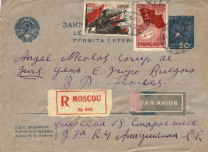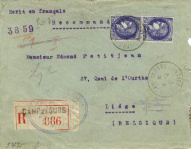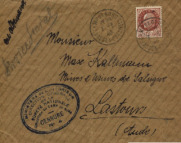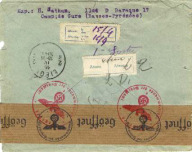Built in one month and half on a ground of almost 80 hectares and placed under the direction of Commander DAVERGNE, this vast camp will be operational as of April 1939 with the arrival of 980 Spanish internees.
April 16, GURS gathers already 4,659 refugees and they are more than 15,000 on April 25. The forecasted manpower of 18,000 people will quickly be exceeded to reach 18,985 men on May 10, 1939.
428 huts had been built to accomodate them including 46 reserved for the troop. A 1,700 m long road was created and a 3 kilometers railway posed. 250 kilometers of barbed wires surrounded the camp.
Among the internees, more than 8,000 belonged to the International Brigades and came mainly from ST-CYPRIEN. 6,000 of them will arrive at GURS on April 20, 1939.
If the living conditions appreciably improved compared to ARGELES and ST-CYPRIEN, they do not remain less precarious about it: no lighting in the huts, severely rationed water. The internees not being able to make a suitable toilet must fight permanently against the lice, the bugs... and the rats!
An insufficient and badly balanced food added to the lack of hygiene causes diseases and generates a significant number of neuroses and obsessional behaviors.

Registered letter from Moscow dated 10-10-1939 bound for a member of Bulgarian group of the International Brigades interned in GURS.

After having lodged Spanish refugees, the CAMP OF GURS is used by the regime of Vichy to intern political prisoners and Jews. It is the most important camp of the south of France.
As of October 1940, arrive there nearly 6,500 expelled German Jews of the Country of Bade, Palatinat and the Saar, within the framework of Operation BURCKEL.
They will be followed, December 19, 1940, by the Spanish internees of ST-CYPRIEN after closing of this camp for medical reasons.
In his survey of the Jewish camps in July 1942, DANNECKER will declare:
"The huts are in very bad condition. According to the direction of the camp, the absorption capacity of the camp is consequently strongly reduced. Total number of internees (Jewish): 2,599 including 1,912 old German subjects, and 335 other deportable. It should be noticed that on 1,912 Jews of ex-german nationality who almost all come from Palatinat, 40% are more than 55 years old."
From August 1942 at March 1943, six convoys will transport 3,907 Jews, men and women, towards AUSCHWITZ via DRANCY.
November 1, 1943, the camp is dissolved and the internees are transferred to the Camp of NEXON. It preserves nevertheless, until the Release, 229 internees (gipsies, political prisoners and "common right").
During the winter 1940-1941, 800 Jews died in GURS.

Willing to relieve the distress of their co-religionists interned in the CAMP at GURS, the rabbi Rene KAPEL, with the assistance of some companions in misfortune, created in the month of January 1941 a "COMITE CENTRAL d'ASSISTANCE (C.C.A.) (Assistance Central Commitee) in charge of the centralization of the various social, religious and cultural activities.
It was directed by rabbi Léo ANSBACHER, chaplain of the camp, max ANSBACHER, Ludwig ZUCKERMANN, Siegfried ROTHSCHILD, Hellmut NATHAN, Ivan COHEN and Manfred BAUER, most of them Juifs expelled of Belgium in spring 1940 and interned in CAMP at ST-CYPRIEN until its closing at the end of October 1940.
At ST-CYPRIEN, these men had already organized a committee in charge of helping the poorest and representing the whole internees in front of the camp's administration.
Transfered at GURS, they did want to create a similar service.
Very quickly, the new "COMITE CENTRAL D'ASSISTANCE" was very efficient.
In its study "Contribution à l'Histoire des Camps d'Internement" (Ed. du CDJC, PARIS 1946), J. WEILL gives a significant example :
"Each area named a social committee composed of eight people. Each of them assumed the control of two huts, so that all the hutments of the area were the object of a constant monitoring.
"the secretary of the Committee was also the social delegate of the area for the C.C.A.
"Frequent meetings made it possible the executive to acquire an exact sight of the social problems for each area, thanks to the information provided by the social delegates. The connection with the family was established, the parents were alarmeds, reports were transmitted , and calls were diffused.
"From each mandate arriving at the camp, the recipient paid 5% to the social cash-box. A modest contribution was also raised on arrival of a package. The benefit of the canteens provided an regular income to the central cash-box. From time to time, bazaars, concerts were organized to feed the funds.
"One of the most delicate tasks was the tracking of the poor, ashamed, which refused until the extreme limit any form of help.”
The action of the C.C.A. at GURS was shown in example. It is also representative of the spirit which reigned in this place and perfectly symbolizes the will not to yield to fatalism.
But with the intensification of the deportations during the summer 1942, this organization was dissolves, the CAMP OF GURS being almost empty.

Registered letter from Hellmut NATHAN, member of the "COMITE CENTRAL
D'ASSISTANCE" of CAMP at GURS, dated 4-4-1941, to LIEGE.


In a registered letter dated 1941 April 2nd and shipped from GURS April 4th, Hellmut NATHAN points out the difficult conditions which brought him from Belgium to the CAMP at GURS:
"I laeved from over there on May 1st (1940).
"After a long and hard travel with various incidents, we arrived, after stays at TOURNAI and two French camps, at the CAMP at ST-CYPRIEN (Pyrénées-Orientales) and finally here at the CAMP at GURS, at the beginning of November (1940). I omit a detailed description of the situation: you guessed it. Fortunately I found an occupation in an office of the camp that makes spend time and makes forget… (In fact it enables me to write to you with the machine during a free time)."My projects? How to make some today? All depends on the events, obviously. I work on my emigration to the United States. But it is without illusions! If all that lasts, perhaps will I be able (or should rather say “will I have") to leave for America. Iis it necessary to say to you that I would largely prefer to see you soon.”

22/12/2009



